- Home
- Elmore Leonard
Up in Honey's Room cw-2
Up in Honey's Room cw-2 Read online
Up in Honey's Room
( Carl Webster - 2 )
Elmore Leonard
The odd thing about Walter Schoen, German born but now running a butcher shop in Detroit, he's a dead ringer for Heinrich Himmler, head of the SS and the Gestapo. They even share the same birthday.
Honey Deal, Walter's American wife, doesn't know that Walter is a member of a spy ring that sends U.S. war production data to Germany and gives shelter to escaped German prisoners of war. But she's tired of telling him jokes he doesn't understand—it's time to get a divorce.
Along comes Carl Webster, the hot kid of the Marshals Service. He's looking for Jurgen Schrenk, a former Afrika Korps officer who escaped from a POW camp in Oklahoma. Carl's pretty sure Walter's involved with keeping Schrenk hidden, so Carl gets to know Honey, hoping she'll take him to Walter. Carl then meets Vera Mezwa, the nifty Ukrainian head of the spy ring who's better looking than Mata Hari, and her tricky lover Bohdan with the Buster Brown haircut and a sly way of killing.
Honey's a free spirit; she likes the hot kid marshal and doesn't much care that he's married. But all Carl wants is to get Jurgen Schrenk without getting shot. And then there's Otto—the Waffen-SS major who runs away with a nice Jewish girl. It's Elmore Leonard's world—gritty, funny, and full of surprises.
Elmore Leonard
Up in Honey's Room
For my boys, Pete, Chris and Bill
One
Honey phoned her sister-in-law Muriel, still living in Harlan County, Kentucky, to tell her she’d left Walter Schoen, calling him Valter, and was on her way to being Honey Deal again. She said to Muriel, “I honestly thought I could turn him around, but the man still acts like a Nazi. I couldn’t budge him.”
“You walked out,” Muriel said, “just like that?”
“I valked out,” Honey said. “I’m free as a bird. You know what else? I won’t have to do my roots every two weeks. Dumb me, I spent a whole year wanting him to think I’m a natural blonde.”
“He couldn’t tell other ways you aren’t?”
“Anytime Walter wanted some, he’d turn out the light before taking off his pajamas. He was self-conscious about being skinny, his ribs showing, so it was always pitch-dark when we did it. He said American food, all it did was give him gas. I had to learn to cook German, big heavy dinners, sauerbraten with red cabbage, bratwurst. For the first time in my life I had to watch my weight.
Walter didn’t gain at all. He still passed gas, only now it was okay, it was German gas. He’d cut one, aiming his finger at me like it’s a gun? I’d have to pretend I was shot.”
“And fall down?”
“If I was near the sofa. Or stumble around holding where I was shot. The first time, I did it on my own, acting goofy? But then every time he cut one and I heard it, I had to pretend I was shot.”
“You and hubby having fun.”
“Except he never laughed or even smiled. I’d see him aiming at me . . . ” Honey let a moment of silence go by. “Tell me how my brother’s doing. Is he working?”
“He’s back in jail. Darcy got in a fight he swears he didn’t start. Broke his foreman’s jaw and it violated his parole. Darcy has to finish the sentence he got for making moonshine and do time for assault. He’s working in the kitchen as a butcher making five cents an hour while I’m trying to live on tips.” Muriel’s voice turned pouty saying, “‘What do I have to do, get you boys to have another round?’ Here’re these hotshots with coal dust in their pores saying things like ‘How about showing us your goodies?’ I roll my eyes and act cute, it’s worth about a buck and a half. But hey, I want to hear about your situation. Walter hit you and it woke you up or what? You were only married to him about a year.”
“One year to the day I walked out,” Honey said, “November the ninth. I brought him a plate of Limburger and crackers, he won’t eat American cheese. Walter’s sitting by the radio, the volume turned up. I said, ‘You happen to know what anniversary today is?’ He’s listening to the news, the German Army going through Poland like rhubarb through a tall woman. France is next and England’s getting ready. I asked him again, ‘Walter, you happen to recall what anniversary falls on November the ninth?’ It was like I lit his fuse. He yells at me, ‘Blutzeuge, the Nazi Day of Blood, idiot.’ He’s talking about the day Hitler started his takeover in 1923 that didn’t work and he ended up in prison. But that date, the ninth of November, became a Nazi holy day. It’s why he picked it for our wedding. ‘The Day of Blood.’ Only Walter called it ‘the Night of Blood’ as we’re going to bed together for the first time. I let him think I was still a virgin, twenty-five years old. He climbed on top, and it was like a one-minute blitzkrieg start to finish. He never asked if I was okay or checked the sheet, he was through. Anyway, I said to Walter, standing by the radio with his cheese and crackers, ‘Dumb me, I thought you’d remember the ninth as our wedding anniversary.’ He didn’t bother to look up, he waved his hand at me to get away, stop bothering him. I took that as my cue and walked out.”
Muriel said, “You didn’t hit him over the head with the cheese plate?”
“I thought about it but went upstairs and took twelve hundred dollars, half the money he kept stuck away in the bedroom closet. He didn’t think I knew about it.”
“Is he on the lookout for you?”
“Why, ’cause he misses me? We had so much fun together?”
She told Muriel, now that she wasn’t keeping house for the Kaiser she had an apartment in Highland Park and was back at J.L. Hudson’s doing what she called “tit work,” fitting brassieres on big foreign women who’d come here to work. “Some of ’em, you have to hold your breath or their B.O.’ll knock you unconscious.” She told Muriel she ought to come to Detroit and stay with her, get a real job while Darcy’s doing his time. Next, she had to ask about her mom. “How’s she doing at the home?”
“I doubt she knows where she is,” Muriel said. “I walk in and kiss her, she gives me a blank look. It’s pitiful, your mom not being that old.”
“You sure she isn’t faking, playing ‘poor me’? Remember I came here I asked her to live with me? She says oh, it’s too cold up north. Afraid she’ll slip and fall on the ice and break her hip.”
“The other night,” Muriel said, “they showed an Errol Flynn movie and your mom got excited, she thought Errol Flynn was Darcy.” Muriel put on a slow tone of voice and was Honey’s mom, wanting to know, “‘What’s Darcy doing in this movin’ pitcher? When’d he grow a mustache?’ But anytime Darcy came to visit, her only living son, your mom didn’t have a clue who he was. I told Darcy how she got him confused with Errol Flynn, Darcy says, ‘Yeah . . . ?’ Like, what else is new? He thinks he’s a dead ringer for Errol Flynn except for the mustache. You want to bet he isn’t growing one this minute, sitting in his prison cell?” She said, “You see a resemblance, Darcy and Errol Flynn?”
“Maybe a little,” Honey said, remembering Walter Schoen asking the same question, who she thought he resembled, that day they first met. Now Muriel was saying she had to get ready for work, tease her hair and pad her bra. Honey said, “Talk to you soon.”
This was in November 1939.
She hung up the phone still thinking of Walter a year ago, in front of Blessed Sacrament Cathedral, waiting for her. Honey coming out of eleven o’clock Mass. Walter buying Social Justice from a boy who carried the tabloid in a sack hanging from his shoulder. Walter seeing her as he turned, waiting among the people walking past him, Walter moving now to head her off and she stopped in front of him. He stared at her, finally taking off his hat.
“Your name is Honey Deal, yes?”
She said, “Yeah...?” with no idea what he was up to.
He took her hand
and introduced himself, Valter Schoen, with his accent and the hint of a bow and, Honey believed, clicking his heels, though she wasn’t positive.
“Last Sunday,” Walter said, “I observed you talking to a woman I know is herself from Germany and asked her your name. She told me Honey Deal. I said to her what kind of name is Honey? She could be Nordic, her blond hair.”
“I’m German,” Honey said, “but born and raised in Harlan County, Kentucky.”
They stood looking at each other, Walter Schoen wearing little round pince-nez glasses pinched on the bridge of his nose, his hair shaved high on the sides and combed flat on top. Honey saw it as German military, judging from pictures in Life of Adolf Hitler and his crowd. Walter even looked like one of them. He replaced his hat, touching the brim with the palms of his hands, making sure the brim took a slight turn up on one side and down on the other. Honey could see him staring into a mirror to get just the right look: Walter Schoen in a four-button slim-cut suit that had to be tailor-made, a black suit buttoned up on his bony frame; Walter staring like he was making up his mind about her, the paper he’d bought from the kid, Social Justice, folded under his arm.
“I must confess to you,” Walter said, “for weeks now, every Sunday I spend the entire Mass staring at your golden hair.” Walter serious, nodding his head, and she wanted to say, “My hair?” But now he was telling her you don’t see blond hair so much, “Naturally blond hair except in Nordic countries and of course Germany.” Honey touched the pillbox sitting on top of her head, still there covering her blond hair’s dark roots, Walter telling her, “I knew a family by the name of Diehl in Munich.”
“D–I–E–H–L?” Honey said. “That’s how my granddaddy spelled our name, but the Immigration people on Ellis Island changed it to D-E-A-L and we’re stuck with it.”
“That’s too bad,” Walter said. “But it remains German because you are. I was a lad of fourteen when my father brought us here on the eve of the Great War. He opened a meat market and made me learn the business.” He turned to Woodward Avenue and looked south toward downtown Detroit, four miles in the distance. “The market I still have is only a few blocks from here.”
“So you’re a butcher,” Honey said. He sure didn’t look like one. She thought he was cute in kind of a mysterious foreign way, like a professor with his accent and little round glasses. “How much is your ground beef?”
“We have a special on chuck this week, three pounds for a dollar. While I still operate the market,” Walter said, “I am looking to buy a meatpacking plant in the vicinity of the Eastern Market, where farmers bring their goods to sell.” He told Honey his mother and father were both buried in Holy Sepulchre and his older sister was an IHM nun, Sister Ludmilla, who taught fourth grade at Blessed Sacrament, the school on Belmont behind the cathedral.
“She is my only relative now in America,” Walter said, and began asking about Honey’s family, the Deals. “Your ancestors are all German?”
“Oh, yes, definitely,” Honey said, leaving out her dad’s grandmother from somewhere in Hungary, the woman a Gypsy who had stored money away and left her dad enough to buy a coal mine and go broke. Honey said, you bet, her people were all of pure German stock, because it was what Walter wanted to hear, and because it didn’t matter to Honey if Walter was a butcher. So was her brother Darcy, in prison. She liked Walter’s air of mystery, a lot different from how the good ole boys in Harlan County acted. Detroit had a lot of hotdog southern boys, too, working in plants. If Walter was fourteen on the eve of the Great War, he would have been thirty-eight the day they met.
He said when his father brought the family here, only months before the beginning of the World War, he was furious. In only three years he would have been a grenadier in the German Army.
Honey said, “You were anxious to fight Americans?”
“I didn’t think of who was the enemy, I wanted to serve the Fatherland.”
“You wanted to wear a uniform,” Honey said, “with a spike on top the helmet. But you might’ve been one of the twenty million killed or wounded in that war.”
He paused but kept looking at her. “How do you know that?”
“I read,” Honey said. “I read Life and all kinds of magazines. I read novels, some of ’em about war like Over the Top by Arthur Guy Empey, and my dad told me what it was like over there. He was gassed on the Western Front when it wasn’t all quiet. My dad talked funny, real hoarse. He was funny anyway.” She said after a moment, “The shaft he was working flooded and my dad drowned.”
Walter said, “Did you know another twenty million died the year following the war?”
“From the Spanish flu,” Honey said. “It took both my sisters and my baby brother. My older brother’s still home. He’s worked mines, but prefers other pursuits.” She didn’t mention Darcy was in prison.
“So there are good ways to die,” Walter said, “and far less desirable ways. Die as a hero or suffocate in a hospital bed.”
Honey looked past him toward the cathedral, cleared of churchgoers now. Walter asked if he could drive her home. Honey said she lived only a few blocks north, in Highland Park, and liked to walk. She could tell he wanted to keep talking to her, saying what an advantage it was to be born in the year 1900.
“You know exactly how old you were when important historical events took place. I know I was twenty-three when Adolf Hitler first came into prominence. You say you read, you must know about the famous Beer Hall Putsch in Munich. I was twenty-five when Mein Kampf was published and I read it, a little later, from cover to cover.”
Honey said, “Did you like it?”
It stopped him. “Did I like it...?”
“All these important historical events you remember happened in Germany?”
“I was thirty-two when Roosevelt was first elected your president.”
“Isn’t he your president too?”
Honey believed she could have fun with Walter. She liked to argue, especially with people who were serious about weird ideas they swore were true. Like the ones who read Social Justice, written by a priest she’d heard on the radio, Father Charles Coughlin, with a voice like syrup, but talked about a conspiracy of Jews being international bankers or atheistic Communists, either way out to get us.
“Yes, unfortunately he is the president,” Walter said, sounding like he was about to start in on Roosevelt, Honey’s choice in the ’36 election to beat that boring Republican Alf Landon. She looked at her watch.
“I’m sorry, Walter, but I have to scoot. I’m going downtown to the show with a friend of mine.” Her favorite place to get into discussions was in a bar over a rye and ginger and smoking cigarettes, not standing in front of a church.
Walter said, “Wait, please,” putting his hand on her bare arm. “I have to ask you, is there someone who comes to mind you think I resemble?”
Like the guy was reading her mind.
“The way you look at me,” Walter said, “I wonder if you’re trying to remember his name.”
“I was, as a matter of fact,” Honey said. “He’s a high-up Nazi officer, I think one of the main guys under Hitler. I saw a picture of him in Life magazine during the past couple of weeks.”
Walter said, “Yes...?”
“In his uniform and boots, all-black. Wearing glasses just like yours pinched on his nose. This is the first time I’ve ever seen a pair this close. Do they hurt?”
“Certainly not,” Walter said.
“He was inspecting a bunch of guys lined up standing at attention, wearing what looked like swimming trunks.”
Walter nodded, starting to put on a smile. He must’ve seen the picture she was talking about.
“The guys are sucking in their stomachs,” Honey said, “trying to look like they’re in shape.”
“They are in top shape, the peak of fitness.” Walter’s voice cold now. “Do you know his name or not?”
Yes, she knew it, but couldn’t come up with the name, Walter staring at her, very serio
us about this. She thought, Heinrich-
And said, “Himmler.”
Walter’s expression eased.
“If I may agree with you, yes,” Walter said, “he is the one to whom I hold a striking resemblance, Heinrich Himmler, Reichs-führer, the highest rank in the SS.”
He did, he looked an awful lot like Himmler, the wispy mustache, the same straight nose and the tiny glasses pinched to the bridge. Honey said, “Walter, I swear you look enough like Himmler to be his twin brother.”
“You flatter me,” Walter said.
He seemed to smile-no, something was going on in his head. Honey watched his eyes shift away and come back to linger on her, his voice hushed to keep what he said between them.
“Heinrich Himmler was born the seventh of October, 1900. Which is the same day I was born.”
“Really?”
“In the same hospital in Munich.”
This time she said, “Wow,” impressed, and said, “You think there’s a chance you really are Himmler’s twin?”
“The same hospital, the same day, the same time of birth and, as you see, the same likeness. The question I ask myself,” Walter said, “if Heinrich and I are of the same blood, from the loins of the same woman, why were we separated?”
Two
Honey’s intercom buzzed while she was getting ready to go to work. The male voice said hi, he was Kevin Dean, a special agent with the Federal Bureau of Investigation; he’d like to talk to her about Walter Schoen. Honey said, “You all are just getting around to Walter? I haven’t seen him in five years.”
Kevin Dean said he knew that, he still would like to talk to her. Honey said, “He didn’t do anything subversive then that I know of and I doubt he has now. Walter isn’t the real thing, he pretends he’s a Nazi.”
She buzzed open the door downstairs and put her flannel bathrobe on over her bra and panties, her hose and garter belt. Then paused and said, “Hmmmm.” Took off her bra and the bathrobe and slipped on an orange-colored kimono with red and ochre trim to be more comfortable.

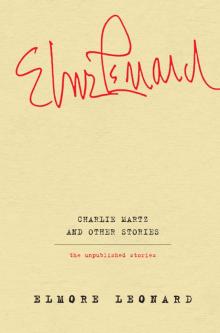 Charlie Martz and Other Stories: The Unpublished Stories
Charlie Martz and Other Stories: The Unpublished Stories Elmore Leonard's Western Roundup #2
Elmore Leonard's Western Roundup #2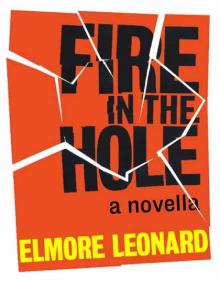 Fire in the Hole
Fire in the Hole Tishomingo Blues (2002)
Tishomingo Blues (2002)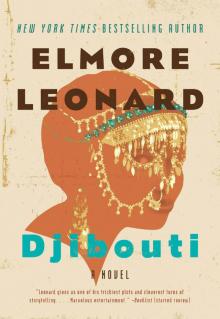 Djibouti
Djibouti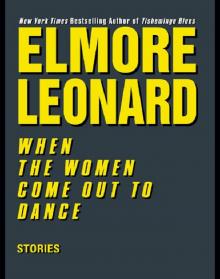 When the Women Come Out to Dance: Stories
When the Women Come Out to Dance: Stories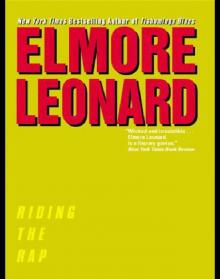 Riding the Rap
Riding the Rap Moment of Vengeance and Other Stories
Moment of Vengeance and Other Stories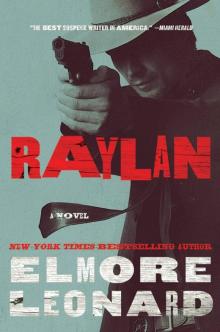 Raylan
Raylan Touch
Touch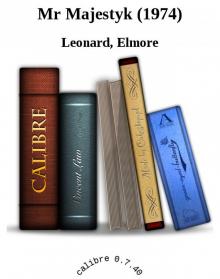 Mr Majestyk
Mr Majestyk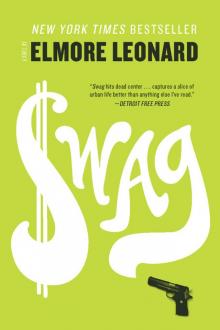 Swag
Swag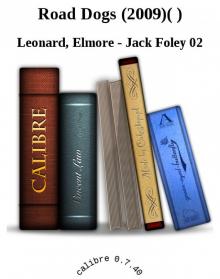 Road Dogs
Road Dogs La Brava
La Brava The Hot Kid
The Hot Kid Valdez Is Coming: A Novel
Valdez Is Coming: A Novel Be Cool
Be Cool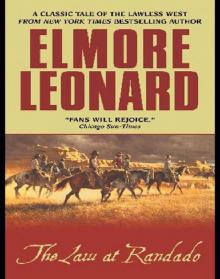 The Law at Randado
The Law at Randado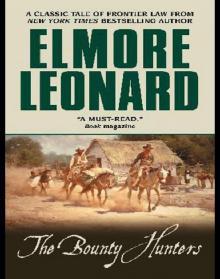 The Bounty Hunters
The Bounty Hunters When the Women Come Out to Dance
When the Women Come Out to Dance 310 to Yuma and Other Stories (1953)
310 to Yuma and Other Stories (1953)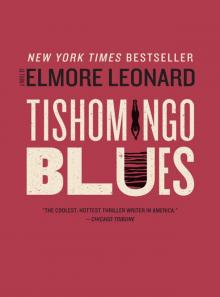 Tishomingo Blues
Tishomingo Blues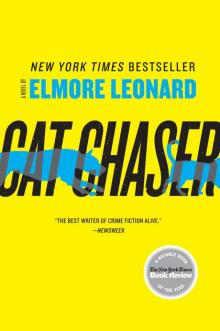 Cat Chaser
Cat Chaser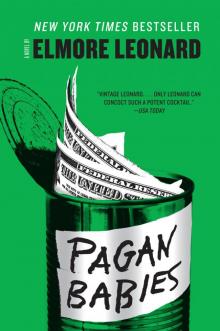 Pagan Babies
Pagan Babies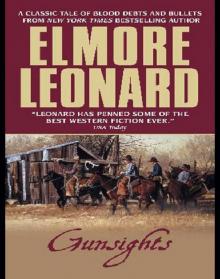 Elmore Leonard's Western Roundup #1
Elmore Leonard's Western Roundup #1 52 Pickup
52 Pickup Stick
Stick The Moonshine War
The Moonshine War Valdez Is Coming
Valdez Is Coming City Primeval
City Primeval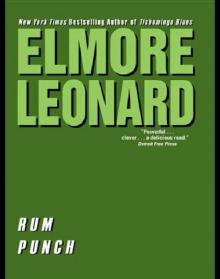 Rum Punch
Rum Punch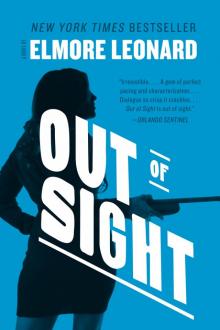 Out of Sight
Out of Sight Naked Came the Manatee (1996)
Naked Came the Manatee (1996)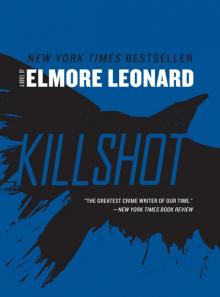 Killshot
Killshot Cuba Libre
Cuba Libre Forty Lashes Less One
Forty Lashes Less One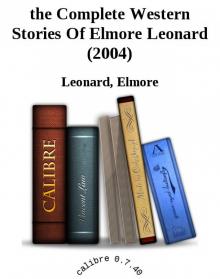 The Complete Western Stories of Elmore Leonard
The Complete Western Stories of Elmore Leonard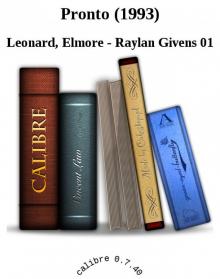 Pronto
Pronto Split Images
Split Images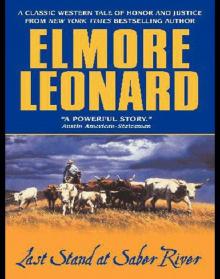 Last Stand at Saber River
Last Stand at Saber River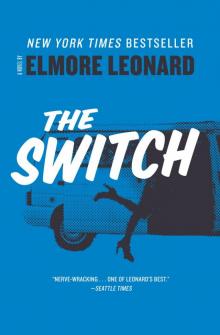 The Switch
The Switch Three-Ten to Yuma and Other Stories
Three-Ten to Yuma and Other Stories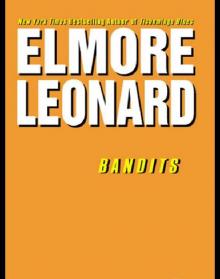 Bandits
Bandits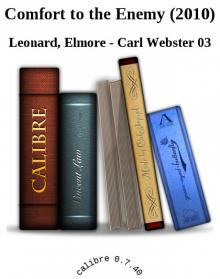 Comfort to the Enemy and Other Carl Webster Stories
Comfort to the Enemy and Other Carl Webster Stories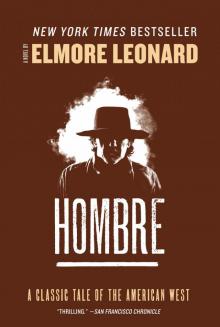 Hombre
Hombre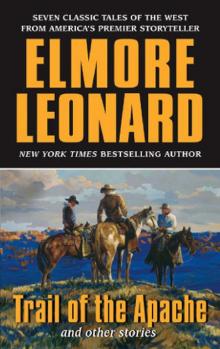 Trail of the Apache and Other Stories
Trail of the Apache and Other Stories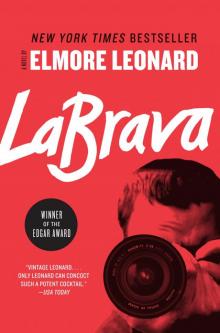 LaBrava
LaBrava Gold Coast
Gold Coast Jackie Brown
Jackie Brown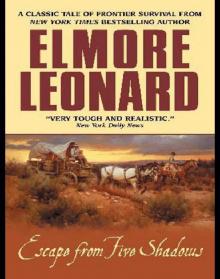 Escape From Five Shadows
Escape From Five Shadows Karen Makes out (1996)
Karen Makes out (1996)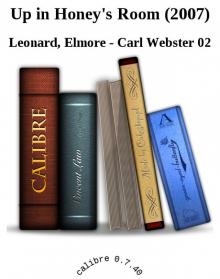 Up in Honey's Room
Up in Honey's Room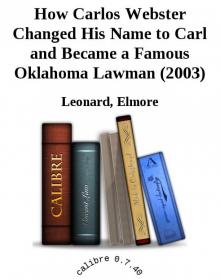 How Carlos Webster Changed His Name to Carl and Became a Famous Oklahoma Lawman (2003)
How Carlos Webster Changed His Name to Carl and Became a Famous Oklahoma Lawman (2003)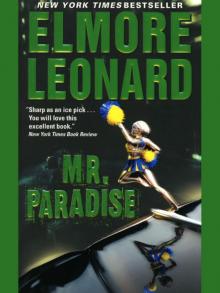 Mr. Paradise
Mr. Paradise The Hunted
The Hunted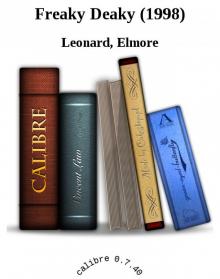 Freaky Deaky
Freaky Deaky Louly and Pretty Boy (Ss)
Louly and Pretty Boy (Ss)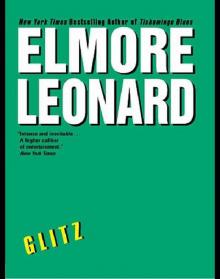 Glitz
Glitz A Coyote's in the House
A Coyote's in the House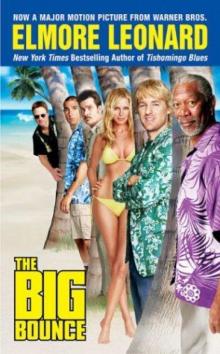 The Big Bounce jr-1
The Big Bounce jr-1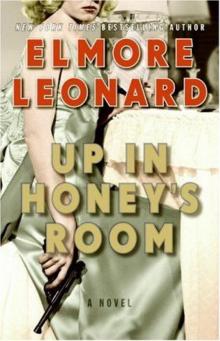 Up in Honey's Room cw-2
Up in Honey's Room cw-2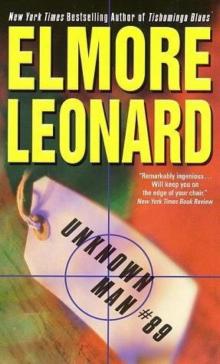 Unknown Man #89 jr-3
Unknown Man #89 jr-3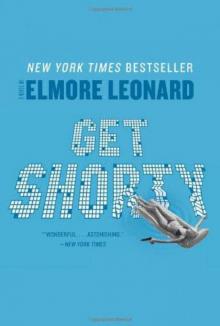 Get Shorty: A Novel cp-1
Get Shorty: A Novel cp-1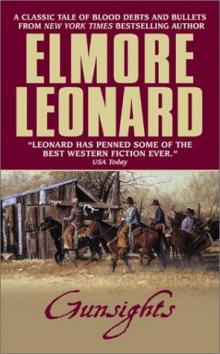 Gunsights
Gunsights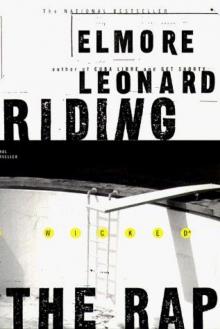 Riding the Rap rg-2
Riding the Rap rg-2